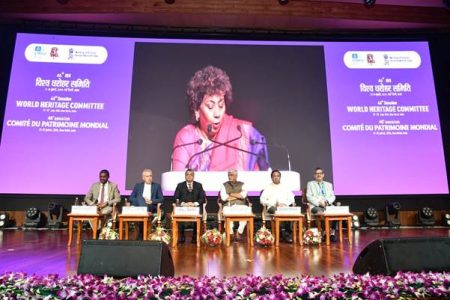New Delhi: The 46th Session of the World Heritage Committee concluded successfully, marking a significant milestone in global heritage preservation. This year’s session was historic, as it was the first time India hosted this prestigious international assembly. The closing ceremony featured Union Minister of Culture and Tourism, Gajendra Singh Shekhawat; H.E. Vishal V. Sharma, Chairman, WHC; Lazare Eloundou Assomo, Director, WHC, UNESCO, and other key dignitaries.
In his address at the closing ceremony, Gajendra Singh Shekhawat acknowledged the swift organization by the Ministry of Culture and the Archaeological Survey of India. He also commended the successful execution of Project PARI (Public Art of India), which celebrates India’s public art inspired by its rich heritage. The event saw the launch of PARI’s catalogue, showcasing various artworks and installations across the National Capital by artists from all over the country.
The evening concluded with a dedicated performance from The Shillong Chamber Choir, marking the end of the 46th Session.
The session was inaugurated by Prime Minister Narendra Modi, alongside UNESCO Director-General Audrey Azoulay and various other international dignitaries. In his keynote address, Prime Minister Modi emphasized India’s deep connection to its cultural heritage and its pivotal role in global conservation efforts. He underscored the country’s commitment to protecting and promoting heritage while balancing sustainable development, highlighting the theme of “Vikas Bhi Virasat Bhi” (Development and Heritage).
Prime Minister Modi also announced several initiatives to enhance global cooperation in heritage preservation and invited international delegates to explore India’s rich historical landscape through specially curated tours and exhibitions.
A major highlight of the session was the approval of 24 new sites for inclusion on the World Heritage List. Among these, India’s Moidams—the ancient burial mounds of the Ahom Dynasty in Assam—were recognized for their historical significance. This addition raises India’s total number of World Heritage sites to 43, emphasizing the country’s rich cultural and historical heritage.
The committee also reviewed the state of numerous existing World Heritage sites, focusing on those deemed at risk. Key decisions were made regarding their conservation status and necessary interventions to ensure their preservation, reflecting the international community’s dedication to protecting these invaluable cultural and natural resources.
In addition to core deliberations, the session addressed various requests for international assistance, highlighting the crucial role of financial and technical support in heritage preservation. India notably pledged $1 million to the UNESCO World Heritage Centre to enhance capacity-building initiatives and support conservation projects in developing countries.
The session featured several forums dedicated to different aspects of heritage management, including the Young Professionals Forum and the World Heritage Site Managers’ Forum. These provided essential platforms for exchanging knowledge and discussing best practices among emerging professionals and experienced site managers.

